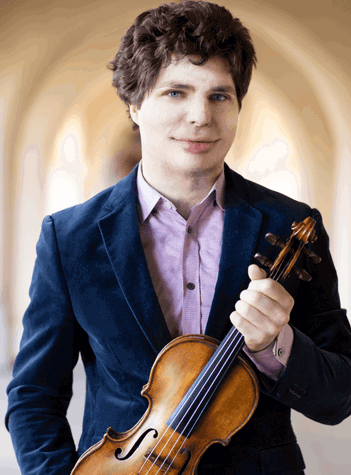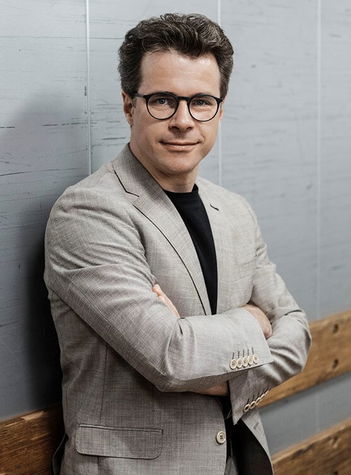Programme
Josef Suk
Tale of a Winter’s Eve, Op. 9
Jean Sibelius
Violin Concerto in D minor, Op. 47
Jean Sibelius
The Oceanides, Op. 73
Josef Suk
Fairy Tale, a suite from incidental music to Zeyer’s fairy-tale drama Radúz and Mahulena, Op. 16
Secure your seat for the 2025/2026 season – presales are open.
Choose SubscriptionHaving met Josef Suk in Berlin, Jean Sibelius called him “a superb musician” in a letter. 90 years have passed since the death of the former, and the latter was born 160 years ago. Commemorating the anniversaries of both composers is the Czech Philharmonic’s principal guest conductor Jakub Hrůša, who calls Suk the love of his life.
Subscription series A
Josef Suk
Tale of a Winter’s Eve, Op. 9
Jean Sibelius
Violin Concerto in D minor, Op. 47
Jean Sibelius
The Oceanides, Op. 73
Josef Suk
Fairy Tale, a suite from incidental music to Zeyer’s fairy-tale drama Radúz and Mahulena, Op. 16
Augustin Hadelich violin
Jakub Hrůša conductor
Czech Philharmonic

At its 1914 premiere, The Oceanides by Jean Sibelius was called “the finest evocation of the sea ever produced in music”. Originally titled Rondo of the Waves, it is one of several works reflecting Sibelius’s fascination with nature.
Sibelius enjoyed improvising on the violin for the ocean and for birds while wandering through the countryside. To his disappointment, he did not become a virtuoso, but it was for the violin that he composed his only concerto: the Violin Concerto in D minor.
When Josef Suk was composing music for the fairytale drama Radúz and Mahulena in 1898, he was playing second violin in the Bohemian Quartet. “I was at work on the music in the woods at Dvořák’s summer home in Vysoká. There was an upright piano in the little room, and my girl Otilie was listening to me outside in the garden. It was springtime in my soul and in the music,” said Suk, recalling the happy period of the beginning of his relationship with Otilie Dvořáková, when he was writing the lyrical music for Zeyer’s play. Three years earlier, the young composer had based A Winter’s Tale on motifs from Shakespeare’s drama The Winter’s Tale.
Bohemian Tales (2020) happens to be the title of Augustin Hadelich’s fourth album. Besides chamber works by Leoš Janáček, Josef Suk, and Antonín Dvořák, it contains a recording of Dvořák’s Violin Concerto played by the American violinist in collaboration with Jakub Hrůša, who is at the moment completing a project to record Suk’s complete symphonic works with the leading Czech orchestra.
Augustin Hadelich violin

The life of Augustin Hadelich is the story of a prodigy from a farm in Tuscany who has managed to rise to the very summit among today’s most important performers worldwide. He was born in the Italian town Cecina (not far from Livorno) to German parents who owned a farm there. He began playing the violin at age five (his two brothers were already playing cello and piano at home) under the guidance of his father, an amateur cellist, who long remained his only teacher apart from a couple of famous violinists (Norbert Brainin and Uto Ughi) who travelled to Tuscany to spend the summer and were also willing to give Augustin lessons. They recognised his great talent, so Hadelich began studies at the Istituto Mascagni, a conservatoire in nearby Livorno. Later, he was admitted to the prestigious Julliard School, where he studied under Joel Smirnoff.
He began his performing career at age 22, when he won the International Violin Competition of Indianapolis (2006). Since then, music critics have been showering him with superlatives for his phenomenal technique, stunning tone colour, and thoughtful interpretations. He finds subtle nuances in compositions, and he does not hesitate to experiment, as he showed in his solo Bach recording, for which he used a Baroque bow to achieve the ideal sound. He is also unafraid to perform contemporary music. In fact, his recording of Dutilleux’s Violin Concerto won a 2016 Grammy.
His concert and recording credits also include many works of the traditional repertoire, such as the Dvořák Violin Concerto on today’s programme, which can be heard on Hadelich’s CD “Bohemian Tales” with Jakub Hrůša and the Bavarian Radio Symphony Orchestra, for which Hadelich won the 2021 Opus Klassik prize and earned a Grammy nomination, which he did not win in this case, although critics praised his ability to tell a story through music, to present an interpretive statement with confidence, or to devote great attention to small details of articulation.
His career races ahead at a hectic pace so the pure sound of his violin, a 1744 Guarneri, will be heard in the world’s most important concert halls. His partners on his musical pilgrimages include America’s most important orchestras as well as the Berlin Philharmonic, the Concertgebouw Orchestra in Amsterdam, the London Philharmonic Orchestra, and the NHK Symphony Orchestra in Tokyo. Hadelich also teaches violin at Yale University and gives masterclasses.
Jakub Hrůša principal guest conductor

Born in the Czech Republic, Jakub Hrůša is Chief Conductor of the Bamberg Symphony, Music Director Designate of the Royal Opera, Covent Garden (Music Director from 2025), and Principal Guest Conductor of the Czech Philharmonic. He was also formerly Principal Guest Conductor of the Orchestra dell’Accademia Nazionale di Santa Cecilia, the Philharmonia Orchestra, and Tokyo Metropolitan Symphony Orchestra.
He is a frequent guest with the world’s greatest orchestras, including the Vienna, Berlin, Munich and New York Philharmonics; Bavarian Radio, NHK, Chicago and Boston Symphonies; Leipzig Gewandhaus, Lucerne Festival, Royal Concertgebouw, Mahler Chamber and The Cleveland Orchestras; Orchestre Philharmonique de Radio France, and Tonhalle Orchester Zürich. He has led opera productions for the Salzburg Festival (Káťa Kabanová with the Vienna Philharmonic in 2022), Vienna State Opera, Royal Opera House, and Opéra National de Paris. He has also been a regular guest with Glyndebourne Festival and served as Music Director of Glyndebourne On Tour for three years.
His relationships with leading vocal and instrumental soloists have included collaborations in recent seasons with Daniil Trifonov, Mitsuko Uchida, Hélène Grimaud, Behzod Abduraimov, Anne Sofie Mutter, Lisa Batiashvili, Joshua Bell, Yefim Bronfman, Rudolf Buchbinder, Gautier Capuçon, Julia Fischer, Sol Gabetta, Hilary Hahn, Janine Jansen, Karita Mattila, Leonidas Kavakos, Lang Lang, Josef Špaček, Jean-Yves Thibaudet, Yuja Wang, Frank Peter Zimmermann, Alisa Weilerstein and others.
As a recording artist, Jakub Hrůša has received numerous awards and nominations for his discography. Most recently, he received the Opus Klassik Conductor of the Year 2023 prize and the ICMA prize for Symphonic Music for his recording of Bruckner’s Symphony No. 4, and the Preis der Deutschen Schallplattenkritik for his recording of Mahler’s Symphony No. 4, both with Bamberg Symphony. In 2021, his disc of Martinů and Bartók violin concertos with Bamberg Symphony and Frank Peter Zimmermann was nominated for BBC Music Magazine and Gramophone awards, and his recording of the Dvořák Violin Concerto with the Bavarian Radio Symphony and Augustin Hadelich was nominated for a Grammy Award.
Jakub Hrůša studied at the Academy of Performing Arts in Prague, where his teachers included Jiří Bělohlávek. He is President of the International Martinů Circle and The Dvořák Society. He was the inaugural recipient of the Sir Charles Mackerras Prize, and in 2020 was awarded both the Antonín Dvořák Prize by the Czech Republic’s Academy of Classical Music, and – together with Bamberg Symphony – the Bavarian State Prize for Music.
Having met Josef Suk in Berlin, Jean Sibelius called him “a superb musician” in a letter. 90 years have passed since the death of the former, and the latter was born 160 years ago. Commemorating the anniversaries of both composers is the Czech Philharmonic’s principal guest conductor Jakub Hrůša, who calls Suk the love of his life.